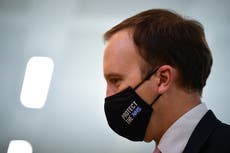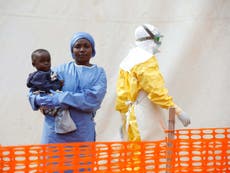The UK must have a global plan on healthcare as coronavirus doesn’t respect borders
No one will be safe from further waves until everyone is safe

Your support helps us to tell the story
From reproductive rights to climate change to Big Tech, The Independent is on the ground when the story is developing. Whether it's investigating the financials of Elon Musk's pro-Trump PAC or producing our latest documentary, 'The A Word', which shines a light on the American women fighting for reproductive rights, we know how important it is to parse out the facts from the messaging.
At such a critical moment in US history, we need reporters on the ground. Your donation allows us to keep sending journalists to speak to both sides of the story.
The Independent is trusted by Americans across the entire political spectrum. And unlike many other quality news outlets, we choose not to lock Americans out of our reporting and analysis with paywalls. We believe quality journalism should be available to everyone, paid for by those who can afford it.
Your support makes all the difference.As the World Health Assembly, the decision-making body of the World Health Organisation (WHO), meets this week, global health has never been higher up the agenda. Faced with a global pandemic, where no one will be safe from further waves until everyone is safe, this meeting is an opportunity the UK cannot miss to champion quality healthcare for all.
More than a million people have been killed by Covid-19 and many more have died from the indirect health impacts due to more limited access to healthcare. In the Global South in particular, the shift towards Covid-19 has seen vital resources directed away from other areas. As we saw with the Ebola virus, this can prove deadly.
With England entering a second national lockdown, it is now sadly apparent that coronavirus is not going away any time soon. This week the Queen Elizabeth Hospital in my constituency announced that it has had to stop all planned procedures due to the influx of Covid-19 patients. If even our NHS is struggling to cope, imagine what it must be like for those countries without strong healthcare systems already in place.
This is unfortunately all too real for at least half of the world’s population who do not have access to essential health services which are key for preventive and curative services.
Even for those people who have access, many have to pay to receive it. They face the prospect of joining the 100m people annually who are pushed into extreme poverty by health care costs.
Globally, there are huge shortages of health workers in low and lower-middle-income countries with at least 18m more needed by 2030 to be able to provide healthcare.
We have seen that places without strong health care systems, based on a premise of healthcare for all, have struggled to deliver pandemic responses which protect their citizens while maintaining existing healthcare provision.
The potential benefits of universal access to healthcare are much wider and include impacts on climate change, tackling poverty and gender inequality.
Against the backdrop of an unprecedented global health and economic crisis, the UK government has an opportunity to highlight our National Health Service as a template for high quality healthcare that is genuinely universal and accessible for all.
Despite having played an important role in championing global health under Labour, in recent years the UK’s commitment to supporting core public health systems like the NHS in poor countries has wavered.
There has not been a global health strategy since the plan published by the last Labour Government in 2008 came to the end of its five-year term.
We are still waiting for a framework from the government on its work on strengthening health systems in developing countries and worldwide, which was promised six years ago.
And astonishingly, as the new Secretary of State responsible for Foreign, Commonwealth and Development Office made cuts to the UK’s aid budget, global health was not presented as a priority – even as we stared down the barrel of a global pandemic.
Labour is the party of strong, properly funded, quality public services and that commitment is both national and international. Our responsibility to protect and improve the health of people in the UK and around the world will only be met by protecting and championing good global health.
Rather than more bluster, Labour are calling on this government to learn the many lessons from this pandemic.
That will mean using British expertise of universal public health systems to support low-income countries build and strengthen their own.
It means working with our international partners to promote policies which increase domestic resources to pay for that quality healthcare.
And finally it means developing a cross governmental global health strategy that will acknowledge the health security challenge facing us, show how we plan to overcome them, and demonstrate how Britain can be a genuine force for good in the world which makes us safer both at home and abroad.
Achieving good health for all and leaving no one behind requires global cooperation and leadership. Now is the time for the UK to step up and play its part.
Preet Kaur Gill is shadow secretary of state for international development and Labour MP for Birmingham Edgbaston





Join our commenting forum
Join thought-provoking conversations, follow other Independent readers and see their replies
Comments